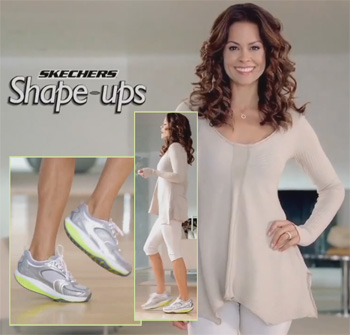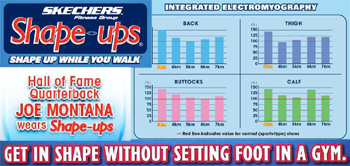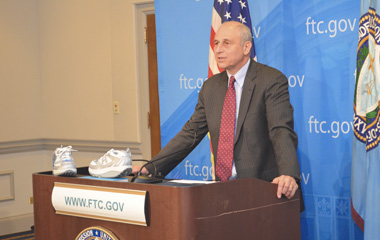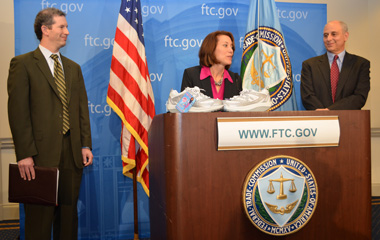The Federal Trade Commission announced that Skechers USA, Inc. has agreed to pay $40 million to settle charges that the company deceived consumers by making unfounded claims that Shape-ups would help people lose weight, and strengthen and tone their buttocks, legs and abdominal muscles.
Besides Shape-ups, Skechers also made deceptive claims about its Resistance Runner, Toners, and Tone-ups shoes, the FTC alleged. Consumers who bought these “toning” shoes will be eligible for refunds either directly from the FTC or through a court-approved class action lawsuit, and can submit a claim here. The settlement with the FTC is part of a broader agreement, also being announced today resolving a multi-state investigation, which was led by the Tennessee and Ohio Attorneys General Offices and included attorneys general from 42 other states and the District of Columbia.
“Skechers’ unfounded claims went beyond stronger and more toned muscles. The company even made claims about weight loss and cardiovascular health,” said David Vladeck, Director of the FTC’s Bureau of Consumer Protection. “The FTC’s message, for Skechers and other national advertisers, is to shape up your substantiation or tone down your claims.”
The settlement with the Manhattan Beach, California-based Skechers is part of the FTC’s ongoing effort to stop overhyped advertising claims, and follows a similar settlement with Reebok International Ltd. last year. The Skechers advertisements challenged by the FTC include:
- A Shape-ups ad telling consumers to “Shape Up While You Walk,” and “Get in Shape without Setting Foot in a Gym,” and claiming that the shoes are designed to promote weight loss and tone muscles. The FTC alleges that Skechers made unsupported claims that Shape-ups would provide more weight loss, and more muscle toning and strengthening than regular fitness shoes.
- Shape-ups ads with an endorsement from a chiropractor named Dr. Steven Gautreau, who recommended the product based on the results of an “independent” clinical study he conducted that tested the shoes’ benefits compared to those provided by regular fitness shoes. The FTC alleges that this study did not produce the results claimed in the ad, that Skechers failed to disclose that Dr. Gautreau is married to a Skechers marketing executive, and that Skechers paid Dr. Gautreau to conduct the study.
- Shape-ups ads featuring celebrities including Kim Kardashian and Brooke Burke. Airing during the 2011 Super Bowl, the Kardashian ad showed her dumping her personal trainer for a pair of Shape-ups. The Burke ad told consumers that the newest way to burn calories and tone and strengthen muscles was to tie their Shape-ups shoe laces.
- An ad that claims consumers who wear Resistance Runner shoes will increase “muscle activation” by up to 85 percent for posture-related muscles, 71 percent for one of the muscles in the buttocks, and 68 percent for calf muscles, compared to wearing regular running shoes. The FTC alleges that in citing the study that claimed to back this up, Skechers cherry-picked results and failed to substantiate its ad claims.

Television personality Brooke Burke appeared in
a Shape-ups commercial touting the shoes’ beneficial
effects on fitness and appearance.
Skechers was the market leader in the toning footwear category. Industry shoe sales peaked in 2010, with sales close to $1 billion. Shape-up fitness shoes, which Skechers introduced in April 2009, cost consumers about $100 a pair. Resistance Runner, Toners, and Tone-ups became available in mid-2010, and retailed for $60 to $100 a pair.
The FTC complaint charges that Skechers violated federal law by making deceptive advertising claims, including falsely representing that clinical studies backed up the claims.
Under the FTC’s settlement, Skechers is barred from making any of the following claims for its toning shoes unless they are true and backed by scientific evidence:
- claims about strengthening;
- claims about weight loss; and
- claims about any other health or fitness-related benefits from toning shoes, including claims regarding caloric expenditure, calorie burn, blood circulation, aerobic conditioning, muscle tone, and muscle activation.
The settlement also bars Skechers from misrepresenting any tests, studies, or research results regarding toning shoes.
[The FTC Skechers settlement page] gives consumers the basic facts about the Skechers settlement and directs them to file for a refund if they are eligible.
Consumers should carefully evaluate advertising claims for work-out gear and exercise equipment. For more information see: How’s that Work-out Working Out? Tips on Buying Fitness Gear.

Some of the product claims used in print and web advertising.
The Commission vote authorizing the staff to file the complaint and proposed settlement was 4-0-1. Commissioner Maureen K. Ohlhausen was recorded as not participating. The complaint and proposed settlement were filed in the U.S. District Court for the Northern District of Ohio Eastern Division on May 16, 2012.
SOCIAL CHATS: FTC staff will answer the public’s questions about the settlement online May 16, 2012 from 2:00 p.m. to 2:30 p.m. ET. Follow the @FTC on Twitter and ask questions using the hashtag #FTCbcp. Questions can also be posted to the FTC’s Facebook page.
 David Vladeck, Director, FTC Bureau of Consumer Protection, announces that Skechers will pay $40 million in consumer refunds to settle FTC charges of deceptive advertising of Shape-ups and other toning shoes at the Federal Trade Commission May 16, 2012. |
|
|
 (Left to Right): Jon Steiger, Director, East Central Region, Larissa Bungo, Assistant Director, East Central Region, and David Vladeck, Director, BCP, answer press questions following the FTC’s announcement that Skechers will pay $40 million in consumer refunds at the Federal Trade Commission May 16, 2012. |
NOTE: The Commission files a complaint when it has “reason to believe” that the law has been or is being violated and it appears to the Commission that a proceeding is in the public interest. The complaint is not a finding or ruling that the defendant has actually violated the law. The consent decree is for settlement purposes only and does not constitute an admission by the defendant that the law has been violated. Consent decrees have the force of law when approved and signed by the District Court judge.
The Federal Trade Commission works for consumers to prevent fraudulent, deceptive, and unfair business practices and to provide information to help spot, stop, and avoid them. To file a complaint in English or Spanish, visit the FTC’s online Complaint Assistant or call 1-877-FTC-HELP (1-877-382-4357). The FTC enters complaints into Consumer Sentinel, a secure, online database available to more than 2,000 civil and criminal law enforcement agencies in the U.S. and abroad. The FTC’s website provides free information on a variety of consumer topics. Like the FTC on Facebook, follow us on Twitter, and subscribe to press releases for the latest FTC news and resources.
(FTC File No. 1023069)
(Consumergoods NR)

